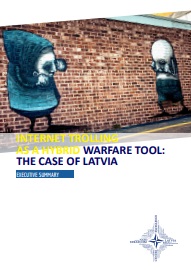INTERNET TROLLING AS A HYBRID WARFARE TOOL: THE CASE OF LATVIA
INTERNET TROLLING AS A HYBRID WARFARE TOOL: THE CASE OF LATVIA
Author(s): Author Not Specified
Subject(s): Politics, Media studies, Geography, Regional studies, Communication studies, Security and defense, Social psychology and group interaction, Methodology and research technology, Evaluation research, ICT Information and Communications Technologies
Published by: NATO Strategic Communications Centre of Excellence
Keywords: ICT; internet; communication; media; social media; hybrid warfare; tool; Latvia; case study; NATO; StratCom; trolls; trolling; Russia;
Summary/Abstract: The executive summary outlines the main conclusions of the study Internet Trolling as a Tool of Hybrid Warfare: Case of Latvia, commissioned by the NATO StratCom Centre of Excellence. The study was conducted by the Latvian Institute of International Affairs in cooperation with Riga Stradins University and the Artificial Intelligence Laboratory of the Institute of Mathematics and Informatics (University of Latvia)1 and was aimed at analysing organised pro-Russian trolling in internet media and measuring its influence on public opinion, using Latvia as a case study. The research provides an opportunity to evaluate the risk potential of trolling, and offers recommendations on how to mitigate its effects when used as a tool in hybrid warfare. A multidisciplinary approach – including communication science, social anthropology, political science and information technology expertise – was applied in order to understand the trolling phenomenon, develop a method for its identification and evaluate its impact on public opinion. Both quantitative and qualitative research methods were used.
- Page Count: 5
- Publication Year: 2016
- Language: English
- Content File-PDF

